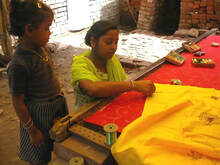NIRMAN was created in
1988. This is our story.
1988. This is our story.

|
When artisans adopted formal education, there was a violent wrenching away from their hereditary occupations and lifestyles; which, though salutary as “freedom”, had negative results because of the poverty of their education.
The “educated” children of artisans typically ended up unemployed, or working as manual labourers, unskilled in any profession. The arts and crafts glorified as “Indian” were progressively on the way to being without producers, consumers, or patrons, except perhaps as rare global commodities.
|
Dr. Som MajumdarAn economist and musician, he took the plunge of addressing the concerns that had arisen from his and others’ research experiences.
|
Dr. Vibhuti Narain SinghThe Maharaja of Banaras was one of the earliest friends and supporters, and gave NIRMAN the building and land in Nagwa to begin work.
|
Dr. Nita KumarOur current director is a historian and anthropologist who has worked on artisans, gender, and education.
|